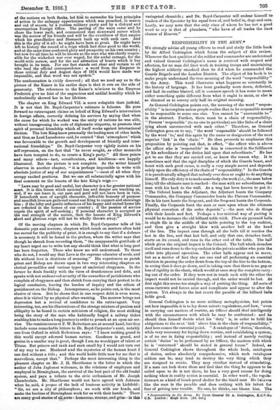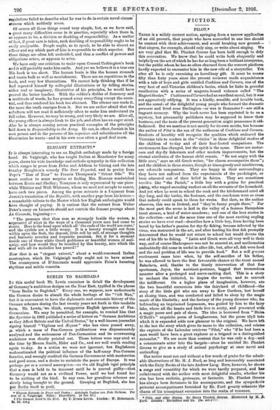RESPONSIBILITY LN THE ARMY.*
WE strongly advise all young officers to read and study the little book by Sir Alfred Codrington which forms the subject of this review. Wherever the best qualities of the soldier and commander are understood and valued General Codrington's name is received with respect and affection, for no man did finer work in training troops and maintaining the highest soldierly standard than ho d:d when he commanded the Guards Brigade and the London District. The object of his book is to make people understand the true meaning of the word "responsibility" in the Army. This word illustratee what happens so constantly in the history of language. It has been gradually worn down, deflected, and had its outline blurred, till in common speech it has come to mean either something quite different from what it ought to mean, or else is so dimmed as to convey only half its original meaning.
As General Codrington points out, the meaning of the word " respon- sibility " is incomplete unless people realize that to be responsible means to be responsible to some one else. You cannot be " answerable to' in the abstract. Further, there must be a chain of responsibility. " Persons responsible ' (to no one in particular) are like links of a chain lying about unconnected with each other." Therefore, as General Codrington goes on to say, " the word ' responsible ' should be followed by the word to,' and this again by the name or designation of the next superior ' link ' in the.' chain.' " He then proceeds to emphasize this proposition by pointing out that, in effect, " the officer who is above the officer, who is 'responsible' to him is concerned in the fulfilment by his subordinate of the duties laid upon that subordinate." He has got to see that they are carried out., or know the reason why. It is sometimes said that the rigid discipline of which the Guards boast, and boast with such good cause, is really a very simple secret and depends solely upon the efficiency of the chain of " responsibility." In the Guards it is paradoxically alleged that nobody over does or ought to do anything himself. His only duty is to make somebody else work (i.e., the man below him) till the ultimate man is reached—the man with no subordinates, the man with his back to the wall. As a wag has been known to put it: " The Colonel hunts the Adjutant, the Adjutant hunts the Company Commander, the Company Commander hunts the Platoon Commander. He in his turn hunts the Sergeant, and the Sergeant hunts the Corporals. Finally, the Corporals hunt the man or men upon whom the ultimate physical execution of the order depends" ;—the mon who do thing* with their hands and feet. Perhaps a less satirical way of putting it would be to instance`the old billiard-table trick. Place six pyramid balls in single file in the middle of the table pointing to the top cushion, and then give a straight blow with another ball at the head of the line. The impact runs through all the balls till it reaches the last in the line, and that last ball, and only that one, detaches itself, starts on its errand, and runs to the other end of the table. The ball which gives the original impact is the Colonel. The ball which detaches itself and runs down to the top cushion is the private soldier who puts the oider into physical operation. The other balls appear not to move, but as a matter of fact they are one and all performing an essential function in passing the order down from the top of the line to the bottom, in seeing that it does go down, and in taking care that there is no gap or loss of rigidity in the chain, which would at once stop the complete carry- ing out of the order. If they were not in touch each with the other the impact would not be carried through, and the order would be lost. At first sight this seems too simple a way of putting the thing. All sorts of cross-currents and forces arise and complicate and appear to alter the system. Yet always in the last resort the parable of the billiard balls holds good.
General Codrington is no mere military metaphysician, but points out how impossible it is to lay down minute regulations, and how, "even in carrying out matters of routine, an Officer should deal intelligently with the circumstances with which he may be confronted : and he should then himself decide what his 'duty' is, in order to fulfil his obligations to the next link ' above him in the chain of responsibility."
And here comes the essential point. " A catalogue of duties,' therefore, while very necessary for laying down routine, and establishing a system, is of no use in fixing responsibility ; and instead of merely reciting certain duties' to be performed by an Officer, the matters with which he is concerned' should be stated in general terms." Indeed, as General Codrington shows throughout the whole book, catalogues of duties, unless absolutely comprehensive, which such catalogues seldom can be, may tend to destroy the very thing which they are designed to create. They may sterilize instead of stimulating, If a man can look down them and find that the thing he appears to be called upon to do is not there, he has a very good excuse for doing nothing when in reality action is essential. In other word •, the regula- tions act as a kind of bomb-proof shelter for the timid man He I. eltves like the man in the parable and does nothing with his talent for fear of getting into trouble. No one, he thinks, can blame him. The • Respontibility in the Amy. By Lleut.-Goners1 fir A. Oodrington, H.C.V.04 C.H. London : Hugh Item tad. ngt4
regulations failed to describe what he was to do in certain novel circum stances which suddenly arose.
Of course all these things sound very simple, but, as we have said, a great many difficulties come in in practice, especially when there is, or appears to be, a division or doubling of responsibility. As a matter of fact, if great care is taken, such doubling of responsibility ought to be easily analysable. People ought, so to speak, to be able to dissect an officer and say which part of him is responsible to which superior. But these things are often left undecided, and thus a conflict of powers and obligations arises, or appears to arise.
We have only one criticism to make upon General Codrington's book and it will probably make him smile. And yet we believe it is a true one His book is too short. The human brain is like the human stomach and wants bulk as well as nourishment. There are no repetitions in the book, and very few illustrations. We cannot help thinking that if he had repeated himself by colloquial illustrations or by telling dories, either real or imaginary, illustrative of his principles, he would have proved the bettor teacher. With the soldier's dislike of flummery and a multitude of words, he has pruned away everything except the essen- tial, and thus rendered his book too abstract. The oftener one reads it. the more the truth emerges from it. But we are rather afraid that the subaltern will not read it sufficiently often to make him understand its full value. However, we may be wrong, and very likely we are. After all, the young officer is always fresh to the job, and often has an eager mind. Also he is always coming across practical examples of the principles laid down in Responsibility in the Army. He can, in effect, furnish in his own person and in the persons of his superiors and subordinates all the illustration ho wants—and in his own case often a good deal more.













































 Previous page
Previous page